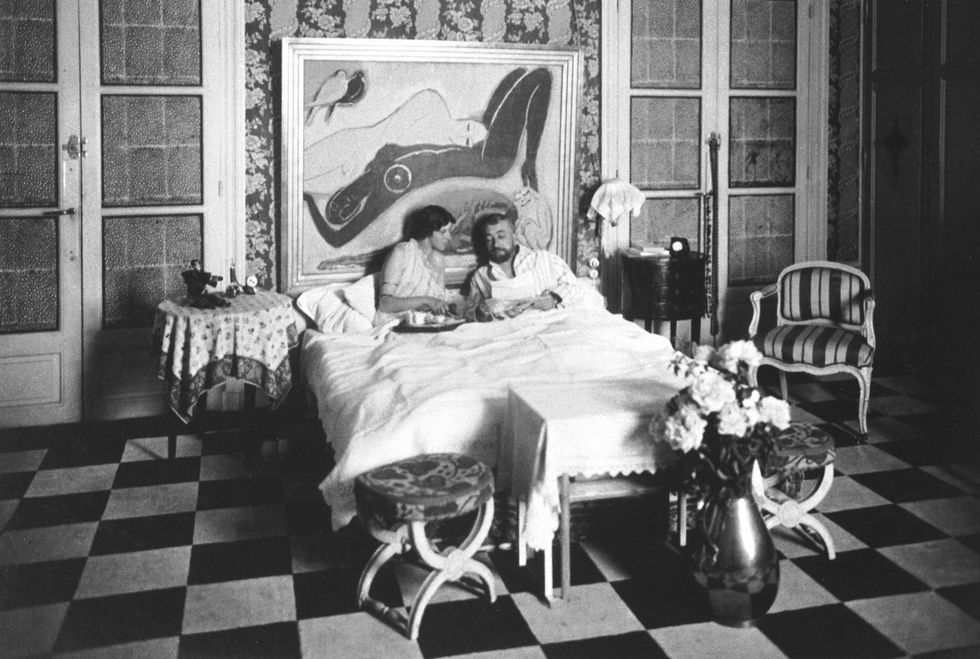
I've always seen the act of sleeping next to someone as inherently and biologically vulnerable—we're unable to respond to threats or quickly defend ourselves because we are, well, yes, asleep. This, paired with growing up with parents who, for as long as I can remember, never shared a bed, has made the thought of sharing one with a romantic or sexual partner a tricky concept for me. As with most people, my parents were my first example of a romantic relationship, along with the guardians and adults I grew up around. Despite knowing that all these examples weren't necessarily good ones, what they did and how they behaved remain engrained in me, for better and for worse. So, for me, sharing a bed tends to feel more intimate than sex. But perhaps it's not just me and it's not just because of my parents—perhaps, generation by generation, sex has just become less and less of a big deal, while vulnerability starts to feel the opposite.

Keystone-France/Getty Images
I began thinking about this concept more and more for two reasons: my anxious dog and a recent personal experience. Up until recently, my dog would only feel comfortable sleeping if I was home with him or if he felt safe. More recently, this tendency resurfaced and manifested in a bout of anxious pacing, despite the fact he was exhausted. On the human level, I think having difficulty falling asleep next to someone new is a common experience—it's certainly usually the case for me. More recently, I met someone and was able to immediately fall asleep next to them, sleeping through the night like a baby. This could be chalked up to pure exhaustion (if it wasn't a reoccurring thing, that is) or just an instant feeling of safety and security—a feeling that, to me, is priceless and incomparable to anything that sex might provide.
"[Sharing a bed] is more likely to feel intimate because while asleep, we turn off our usual guardedness and mechanisms for creating distance," intimacy coach Alexandra Stockwell says. "It is very vulnerable to completely let go and relax enough to fall asleep, [next to someone]."

Heritage Images/Getty Images
A fun fact: though it's seen as "alternative" for couples not to share a bed in modern days, historically, couples shared beds purely out of convenience. If a couple had enough means to accommodate separate rooms, they took advantage of the space. "Sharing a bed used to indicate the level of education and wealth in a couple," Stockwell says. "Poorer couples shared a bed, often with their children for many years, whereas European aristocrats slept in separate bedrooms. For the aristocrats, it was a sign of wealth and didn’t convey anything about the intimacy in the relationship; similarly, for poor couples sharing a bed, it did not mean they were particularly enamored with one another."
Now, sharing a bed is a choice, and it's a particularly notable choice in the early stages of dating, hook-up culture, and one-night stands. I think that the choice, in and of itself, makes the act more special—we don't have to do it but, when we choose to do it, we're also choosing to embrace a specific level of closeness and, perhaps, indicating that we feel safe with someone. Especially at bedtime, we tend to be our most stripped down selves.
Nowadays, adults in an long-term intimate relationship are expected to share a bed as a sign of their closeness and commitment to one another. This started during the Industrial Revolution, when keeping warm was a priority. But again, this is a societal expectation; some couples choose to sleep separately, which is not at all an indication of their level of intimacy. "[In this day and age], intimacy is the experience of seeing, and feeling seen by, another person," says Stockwell. "It’s the experience of feeling psychologically safe to be vulnerable, tender, and openhearted." For most of us, this can mean sharing a bed; but it's not always the case.

With so many cultural analyses out there regarding Gen Z's approach to intimacy, including headlines "The Bizarre Way Gen Z is Getting Intimate," "Has Gen Z Killed Intimacy," and "Why Gen Z Is Saying 'No' To Romance," it's safe to say that our cultural relationship with love, sex, and intimacy is constantly evolving. "Sex used to be something exciting, and hard to come by, at least during adolescence. By and large, it is common for younger generations to wonder what the big deal is about sex," Stockwell says. "That should make sense to older people who really can’t imagine early life with such easy access to information and sexually stimulating experiences, including porn and interactive experiences like OnlyFans.
Gen Z is more concerned with intimacy beyond sex, while also being unwilling to settle for anything less. Millennials tend to have more sex than Gen Z and prioritize it more in relationships, yet both generations are having less sex than their predecessors. This is often attributed to economic pressures, social media, and AI and technology acting as intimacy crutches. Studies show, however, that both Millennials and Gen Z still place a high value in emotional intimacy, seeking it in a form that they're not able to access through their phones: non-sexual connection.
For me, intimacy is more about feeling safe, providing that same feeling for someone else and, in turn, both parties feeling secure enough to fall asleep in close proximity. It's the feeling of being able to fully let go of control, risk snoring, kicking, or other uncontrollable mid-sleep acts without fear of judgement or embarrassment. I think there's a reason why sleep doesn't come naturally next to just anyone—so, when it does, it's a positive sign based on connection and instinct. For others, intimacy might come in the form of innocent physical touch, eye contact or vulnerable conversations—there are so many ways to be intimate outside of sex.
History and context aside, my point is pretty simple: on a biological level, sleep is perhaps our most vulnerable, child-like state. Sharing a bed with someone is the choice to let your guard down without fear of exposing the parts of yourself that can't be controlled. How could it possibly get more intimate than that?




